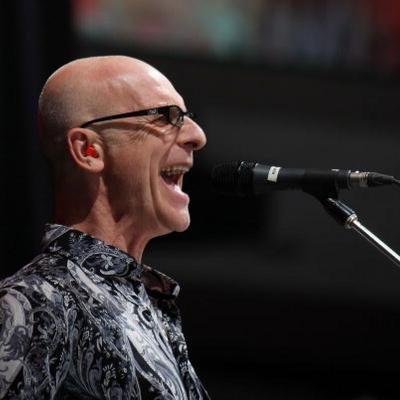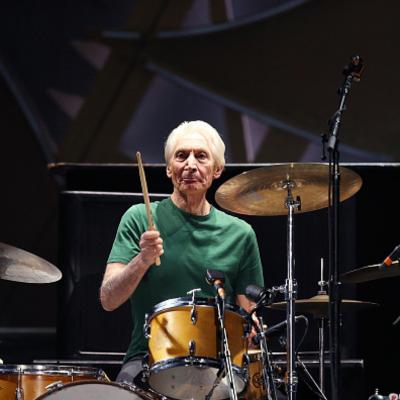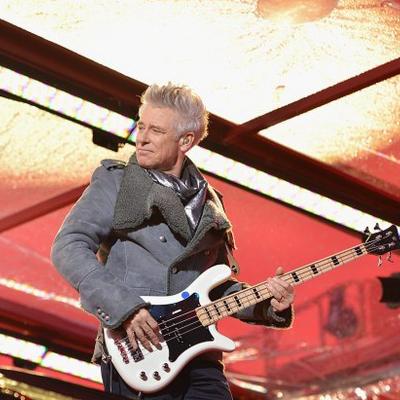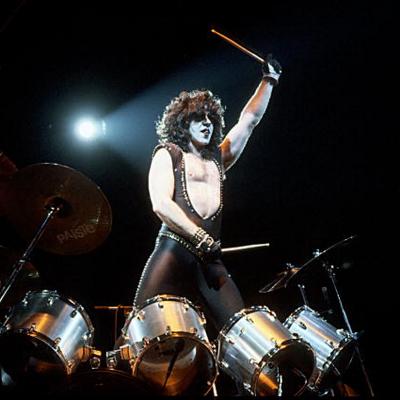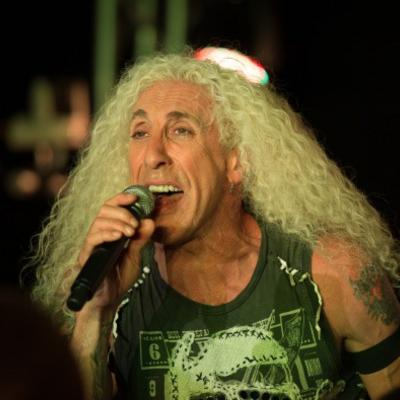What Was Leonard Bernstein's Net Worth?
Leonard Bernstein was an American composer, conductor, author, pianist, and music lecturer who had a net worth of $10 million at the time of his death in 1990. That's the same as around $22 million in today's dollars. According to his will, Bernstein's estate was left t his three adult children to be held in trust with income distributed quarterly. He also made a $1 million donation to his charity, the Spring Gate Corp.
Leonard Bernstein served as the music director of the New York Philharmonic, and he composed or conducted music for productions such as "West Side Story," "Candide," "Peter Pan," "On the Town," "Wonderful Town," "On the Waterfront," and "Mass." "Wonderful Town" won a Tony for Best Musical in 1953, and Leonard was honored with a Special Tony Award in 1969. He also authored several books, including "Findings" (1993), "The Infinite Variety of Music" (1993), "The Joy of Music" (2004), and "Young People's Concerts" (2006). Bernstein earned more than 60 Grammy nominations, winning 16 of them, and he won seven Emmys. He was inducted into the American Theater Hall of Fame and the Television Hall of Fame, and in 1980, he received Kennedy Center Honors. Sadly, Bernstein passed away from a heart attack on October 14, 1990, at the age of 72.
Early Life
Leonard Bernstein was born Louis Eliezer Bernstein on August 25, 1918, in Lawrence, Massachusetts. His parents, Samuel and Jennie, were Jewish, and they immigrated to the U.S. from Rivne, which used to be in Poland but is now part of Ukraine. Bernstein's grandmother wanted his first name to be Louis, but his parents called him Leonard and he legally charged his name when he turned 18. He grew up in Boston with younger siblings Burton and Shirley, and his father owned The Samuel Bernstein Hair and Beauty Supply Company. When Leonard was 10 years old, his aunt moved her piano to the Bernstein home, and Leonard began teaching himself how to play and later took piano lessons. As a teenager, he went to orchestral concerts with his father, and in 1932, he gave his first public performance, playing Brahms' "Rhapsody in G minor" during a recital at the New England Conservatory. Bernstein attended the William Lloyd Garrison School and the Boston Latin School, then he studied music at Harvard College, where he served as a pianist for the Harvard Glee Club as well as the Harvard Film Society's presentations of silent films. He graduated cum laude with a Bachelor of Arts degree in 1939, then he enrolled at Philadelphia's Curtis Institute of Music, where he studied piano, conducting, orchestration, counterpoint, and score reading. Leonard later studied conducting with Serge Koussevitzky, the Boston Symphony Orchestra's music director, and worked as Koussevitzky's conducting assistant at the Tanglewood Music Center.
Career
After moving to New York City, Bernstein found work as a piano teacher, and he also coached singers, played piano for Carnegie Hall dance classes, and transcribed music for Harms-Witmark. In November 1943, he conducted for the New York Philharmonic for the first time when guest conductor Bruno Walter was sick with the flu, and he subsequently made conducting debuts with numerous orchestras across North America. In the mid-1940s, Leonard and Jerome Robbins collaborated on the ballet "Fancy Free," and they expanded it into the Broadway musical "On the Town." Bernstein was the New York City Symphony's music director from 1945 to 1947, and around this time, he began a lifelong association with the Palestine Symphony Orchestra (now known as the Israel Philharmonic Orchestra). In the '50s, Leonard became the New York Philharmonic's music director, and he wrote the scores for several Broadway musicals, including the Tony-winning "Wonderful Town" and the Tony-nominated "Candide" and "West Side Story."
In the '60s, Bernstein got involved with the Vienna Philharmonic, and he was commissioned by Jacqueline Kennedy Onassis to compose a theatrical work for the inauguration of Washington, D.C.'s John F. Kennedy Center for the Performing Arts. He collaborated on it with lyricist/composer Stephen Schwartz, and "Mass: A Theatre Piece for Singers, Players, and Dancers" premiered in September 1971. In 2021, music journalist Edward Seckerson wrote, "Put simply, no other work of Bernstein's encapsulates exactly who he was as a man or as a musician; no other work displays his genius, his intellect, his musical virtuosity and innate theatricality quite like 'Mass.'"
From 1972 to 1973, Leonard was a Professor of Poetry at his alma mater, Harvard, and during his time there, he presented six lectures titled "The Unanswered Question," which were broadcast in 1976 on PBS and later published as a book. In October 1977, his "Songfest: A Cycle of American Poems for Six Singers and Orchestra" debuted at Washington, D.C.'s Kennedy Center, with Bernstein conducting the National Symphony Orchestra. In the '80s, Leonard wrote the opera "A Quiet Place," received a Grammy Lifetime Achievement Award and Kennedy Center Honors, and co-founded the Schleswig-Holstein Musik Festival Orchestral Academy, Los Angeles Philharmonic Institute, and Pacific Music Festival. Bernstein's final concert performance took place in August 1990 at the Tanglewood Music Center with the Boston Symphony Orchestra.
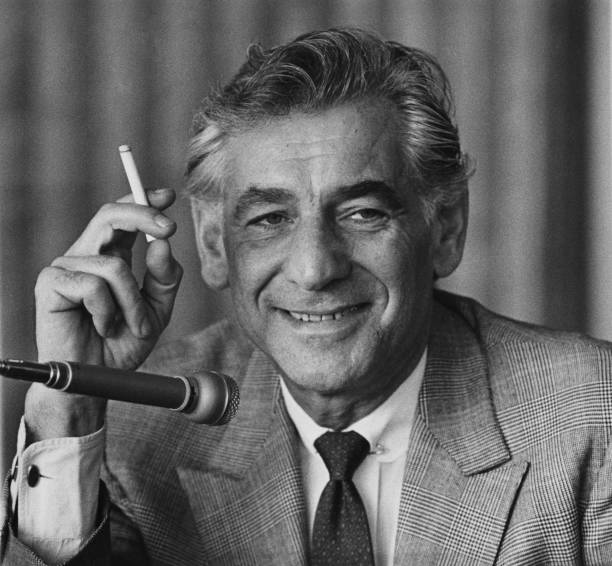
Central Press/Hulton Archive/Getty Images
Personal Life
Leonard married actress Felicia Montealegre on September 9, 1951, and they welcomed children Alexander, Nina, and Jamie together. Bernstein was romantically involved with both women and men throughout his life, and Felicia once wrote in a letter to him, "You are a homosexual and may never change — you don't admit to the possibility of a double life, but if your peace of mind, your health, your whole nervous system depend on a certain sexual pattern what can you do?"
In 1976, Leonard left Felicia to live with music scholar Tom Cothran in Northern California, but he returned to her the following year after she was diagnosed with lung cancer, and he stayed with her until her death in June 1978.
Bernstein was involved with humanitarian and political causes such as Vietnam War protests and the civil rights movement, and the FBI began monitoring him "for his ties to communist organizations" in the '40s. Leonard was able to view his FBI file in the '80s, thanks to the Freedom of Information Act, and it was more than 800 pages long.
In 1970, Leonard and Felicia hosted an event at their Manhattan apartment to raise money for the defense of Black Panther Party members, leading to the couple receiving hate mail and their building being picketed by protestors from the Jewish Defense League.
In 1990, Bernstein received the Praemium Imperiale (lifetime achievement award) from the Japan Arts Association, which came with a $100,000 prize. He used that money to build the Leonard Bernstein Center for Education Through the Arts in Nashville, and it opened in 1992.
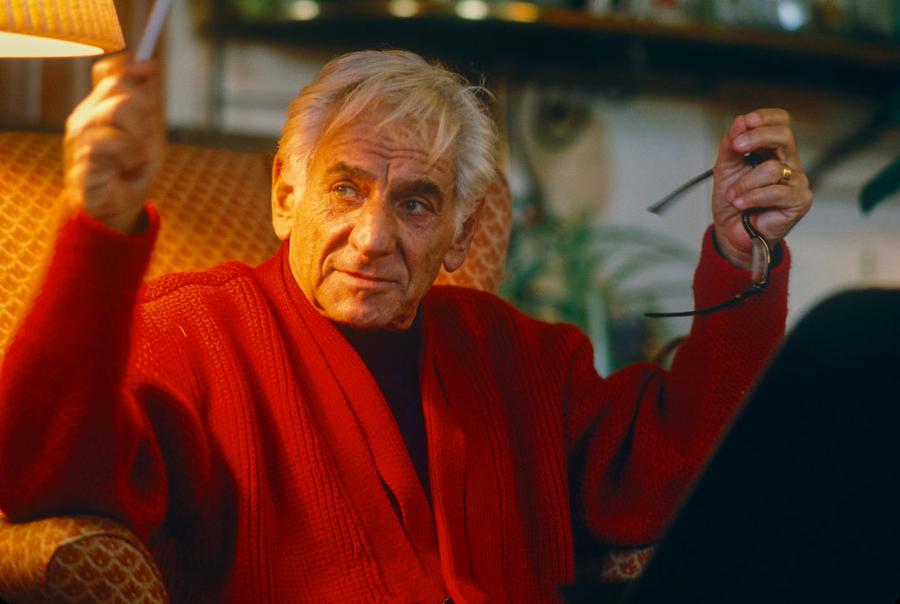
Getty
Death and Legacy
Leonard died of a heart attack in his New York City apartment on October 14, 1990, five days after he announced that he was retiring from conducting. He was 72 years old at the time of his death, and his heart attack was caused by mesothelioma. Bernstein developed emphysema in his mid-50s as a result of his heavy smoking. He was laid to rest next to Felicia at Brooklyn's Green-Wood Cemetery, and according to "The New York Times," he "was buried with the score of Mahler's Fifth Symphony placed over his heart." To celebrate what would've been Leonard's 100th birthday, L.A.'s Skirball Cultural Center presented the exhibition "Leonard Bernstein at 100" in 2018. Curated by the GRAMMY Museum, the exhibition featured more than 150 objects, including "photographs, personal items, papers, scores, correspondence, costumes, furniture, and audio and video recordings."
In September 2023, the film "Maestro," which is about the relationship between Leonard and Felicia, premiered at the Venice International Film Festival, where it earned a nomination for Best Film. In the film, Leonard is played by Bradley Cooper, who also co-wrote and directed the film as well as producing it alongside Martin Scorsese and Steven Spielberg.
Awards and Honors
Bernstein won numerous awards during his career, including 16 Grammys, seven Emmys, and two Tonys, and he earned an Academy Award nomination for Best Music, Scoring of a Dramatic or Comedy Picture for "On the Waterfront" in 1955. He was named a Fellow of the American Academy of Arts and Sciences in 1951 and a Fellow at the artist's residency program the MacDowell in 1962, 1970, and 1972, and in 1958, he won the Ditson Conductor's Award. He received Denmark's Sonning Award in 1965, and he earned Johns Hopkins University's George Peabody Medal in 1980. In 1987, Leonard was honored with the Ernst von Siemens Music Prize, the Edward MacDowell Medal, and the Royal Philharmonic Society Gold Medal. He was appointed a Commandeur de la Légion d'honneur by the French government in 1986, and in 1989, he received Italy's Knight Grand Cross Order of Merit. Bernstein was inducted into Chicago's Legacy Walk in 2015.



